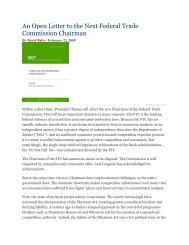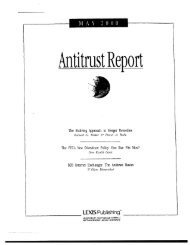TCF National Bank v. Ben S. Bernanke, et al. - Law Offices of David ...
TCF National Bank v. Ben S. Bernanke, et al. - Law Offices of David ...
TCF National Bank v. Ben S. Bernanke, et al. - Law Offices of David ...
You also want an ePaper? Increase the reach of your titles
YUMPU automatically turns print PDFs into web optimized ePapers that Google loves.
Case 4:10-cv-04149-LLP Document 124 Filed 03/11/11 Page 8 <strong>of</strong> 14 PageID #: 1009interchange fees which have harmed merchants and in turn consumers through highermerchandise prices. Indeed, the rapid increase <strong>of</strong> debit card interchange fees in the past decadedemonstrates a significant mark<strong>et</strong> failure.Consumers have significant concerns about the problem <strong>of</strong> esc<strong>al</strong>ating debit cardinterchange fees. In 2009, interchange fees <strong>al</strong>one cost merchants and consumers an estimated$48 billion. Hearing on Interchange Fees Before the Sen. Subcomm. on Fin. Services and Gen.Government, 111th Cong. (June 16, 2010) (testimony <strong>of</strong> Edmund Mierzwinski). Those fees haveincreased three-fold from $16 billion in 2001. 6These fees have a disproportionately harmfuleffect on the 25 percent <strong>of</strong> the population that is unbanked and other consumers that pay by cashand checks, since those consumers never receive the benefits <strong>of</strong> any card rewards programs thatare funded by interchange fees. Y<strong>et</strong> while the under and unbanked Americans receive no benefitfrom these programs, they pay in excess <strong>of</strong> $1 billion annu<strong>al</strong>ly to subsidize those regressiverewards. Hearing on Interchange Fees Before the Sen. Subcomm. on Fin. Services and Gen.Government, 111th Cong. (June 16, 2010) . The Hispanic Institute has reported that the bottom50 percent <strong>of</strong> income earners pay at least $669 million more in higher prices to subsidize at least$354 million in payment card rewards. 7 A recent study by the Feder<strong>al</strong> Reserve <strong>Bank</strong> <strong>of</strong> Bostondemonstrates that interchange fees are a regressive pen<strong>al</strong>ty on the unbanked with each credit cardusing household receiving $1,133 from cash users every year. 86 See <strong>Nation<strong>al</strong></strong> R<strong>et</strong>ail Federation, Credit Card Interchange Fees (2009), available athttp://www.nrf.com/modules.php?name=Pages&sp_id=838.7 The Hispanic Institute, Trickle-Up We<strong>al</strong>th Transfer: Cross-Subsidization <strong>of</strong> Consumers in thePayment Card Mark<strong>et</strong>, November 2009.8 Scott Schuh, Oz Shy, and Joanna Stavins, Who Gains and Who Loses From Credit CardPayments? Theory and Collaborations, Feder<strong>al</strong> Reserve <strong>Bank</strong> <strong>of</strong> Boston Public Policy4




